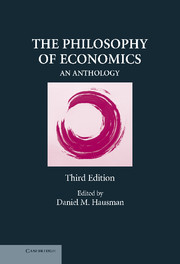Book contents
- Frontmatter
- Contents
- Introduction
- PART ONE CLASSIC DISCUSSIONS
- PART TWO POSITIVIST AND POPPERIAN VIEWS
- 7 The Methodology of Positive Economics
- 8 Testability and Approximation
- 9 Why Look Under the Hood?
- 10 Popper and Lakatos in Economic Methodology
- PART THREE IDEOLOGY AND NORMATIVE ECONOMICS
- PART FOUR BRANCHES AND SCHOOLS OF ECONOMICS AND THEIR METHODOLOGICAL PROBLEMS
- PART FIVE NEW DIRECTIONS IN ECONOMIC METHODOLOGY
- Selected Bibliography of Books on Economic Methodology
- Index
8 - Testability and Approximation
Published online by Cambridge University Press: 05 June 2012
- Frontmatter
- Contents
- Introduction
- PART ONE CLASSIC DISCUSSIONS
- PART TWO POSITIVIST AND POPPERIAN VIEWS
- 7 The Methodology of Positive Economics
- 8 Testability and Approximation
- 9 Why Look Under the Hood?
- 10 Popper and Lakatos in Economic Methodology
- PART THREE IDEOLOGY AND NORMATIVE ECONOMICS
- PART FOUR BRANCHES AND SCHOOLS OF ECONOMICS AND THEIR METHODOLOGICAL PROBLEMS
- PART FIVE NEW DIRECTIONS IN ECONOMIC METHODOLOGY
- Selected Bibliography of Books on Economic Methodology
- Index
Summary
Herbert Simon (1916–2001) was born in Milwaukee, Wisconsin, and received his Ph.D. in political science from the University of Chicago. He taught at the Illinois Institute of Technology and at Carnegie-Mellon University. Simon made major contributions to a number of different disciplines including political science, psychology, philosophy, and economics. He was awarded the Nobel Prize in economics in 1978. The following short essay was written for a symposium on Milton Friedman's methodology that was held at the 1962 meetings of the American Economic Association.
I find methodological inquiry interesting and instructive to the extent to which it addresses itself to concrete problems of empirical science. Thus, while I find myself in general agreement with almost everything that has been said in the previous papers and by discussants, I should like to pitch my remarks at a level less abstract than theirs.
The Relation of Premises and Conclusions in Economic Theory
Professor Nagel has pointed out that whether a particular proposition is a fundamental assumption of a theory or one of its derived conclusions is relative to the formulation of the theory. If this were the whole story, then asymmetry between assumptions and derivations in Friedman's position – what Professor Samuelson called the F-Twist, and what I like to think of as Friedman's “principle of unreality” – would be entirely arbitrary. Professor Krupp's remarks on composition laws and the relation of microscopic to macroscopic theories suggest, however, that something more is at issue.
- Type
- Chapter
- Information
- The Philosophy of EconomicsAn Anthology, pp. 179 - 182Publisher: Cambridge University PressPrint publication year: 2007
- 1
- Cited by



